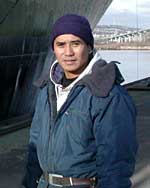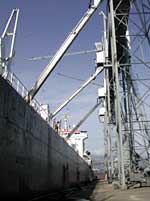By Stephanie Hemphill
Minnesota Public Radio
December 17, 2001
|
| RealAudio |
Law enforcement officials around the country have been stepping up security measures since the Sept. 11 attacks. Even in Duluth, an international port more than 1,000 miles from the nearest ocean, officials are operating at a heightened sense of alert.
Duluth-Superior is the busiest port on the U.S. side of the Great Lakes. It ranks 17th among all ports in the nation. Port officials say they are thinking a lot more about security, and taking various measures to protect the port. But they say a terrorist attack here is unlikely.
| |
|
|
|
||
At the Northern States grain elevator in Superior, the crew of the ship Inviken is loading wheat. The ship's owner is Norwegian. It's registered in the Bahamas, and it sailed from Belgium. Most of the crew is from the Philippines.
Ocean-going ships like the Inviken are attracting more attention these days when they come to U.S. waters. Bosun Alberto Ilagan is supervising a crewman painting some rust spots on the hull.
Ilagan says immigration officers boarded the ship near Chicago, the Inviken's first stop on the American side of the Great Lakes. Officials there asked more questions than they used to.
"It's strange because they're a little bit strict now," says Ilagan. "They're asking how many years you've been a sailor, what year you started traveling in the U.S., things like that."
Immigration officers compare the ship's list of crew members with a list of suspected troublemakers supplied by the FBI. But this isn't the first time U.S. authorities scrutinize the crew list. Usually the U.S. consulate in the ship's home port sends the list to Washington for screening by the FBI and Immigration and Naturalization Service, even before the ship sails to the U.S.
The Inviken's captain, Eulogio Panulaya, says inspectors stopped the ship as it entered the St. Lawrence Seaway. They asked him whether he'd seen anything unusual at his last port in Europe.
And in Ludington Canada, the Inviken got a Coast Guard escort as it passed a big chemical plant. Capt. Panulaya says he doesn't think the Coast Guard suspected his crew, but someone else could have planted a bomb on his ship.
| |
|
|
|
||
Panulaya says he and his sailors are comfortable with the extra precautions. His ship sails the Great Lakes often, and the new security measures protect his crew as well as the people in the ports they visit.
"They know that we are regular, coming here all the time. Before it wasn't like that, but we understand, we feel that it's also for our own safety, so it's for everybody," says Panulaya.
The extra questions take a little more time. That means ships have to spend perhaps an hour or two longer in each port where they are inspected. Panulaya says he doesn't mind, because his life is very busy, and a pause now and then is a welcome change.
But he says the company that charters the ship is paying $10,000 per day, and even small delays are expensive. An hour here and an hour there can add up to real dollars.
Shipping agent Steve Sydow takes care of arrangements while the Inviken is in the Duluth port.
Sydow says ships operate like taxis - they don't usually know their route in advance. He says that decreases the chances they could become tools for terrorism. Stowing away or hiding a bomb on a ship wouldn't be a very effective way for a terrorist to hit a particular target. And he says it's unlikely a terrorist could be hired as a member of the crew.
"The crew that comes on board these ships is chosen for their skill in sailing the Great Lakes. It takes a special skill," Sydow says. "Most officers on board go through a long program, at least four years of training. Targeting anything on the Great Lakes will get you nowhere. It will cost a lot of money and get you nowhere."
More than 100 foreign ships sail through the Duluth Ship Canal every year. Their crews include more than 2,500 sailors from around the world.
| |
|
|
|
||
The Coast Guard is responsible for port safety. About 100 people are stationed here. They normally have jobs like running the icebreaker or checking ships for safety. Now, all of them can be called for security work.
Coast Guard Cmdr. Andrew Palmiotto says probably the most useful change since the heightened concern about security, is weekly meetings organized by the FBI. Everyone from the U.S. Customs Service to the county sheriff is invited. They discuss ways to share information and resources.
"It's like a big team, really, of law enforcement personnel, putting their heads together to address the problem," he says.
Palmiotto has also been working with dock owners to help them increase their security. The main goal is to keep people away from the docks who aren't supposed to be there. But the port sprawls over 45 miles of Duluth and Superior shoreline, and about 3,000 people work here, so controlling access isn't easy.
Until Sept. 11, this port was a pretty relaxed place. Palmiotto says the main cargoes of coal, grain, and iron ore are not very valuable and definitely hard to steal. And even now, with a different sort of threat, the location helps protect the port.
"The port here is removed from the Atlantic - it's centralized in the country," Palmiotto says. "The commerce that flows through here is very important, but there are no symbolic high consequence things that could be destroyed by a terrorist or incident."
One possible target is a Murphy Oil refinery in Superior. The company has added security staff to the gates, and plans to add perimeter lighting to the fence around the refinery. The local airport tells pilots to steer clear of the refinery's air space.
Palmiotto says his staff is working harder and longer than before Sept. 11. He says it still feels like there aren't enough people to protect the port completely. But he says the resources devoted to this port are probably about right, considering the low level of risk.



